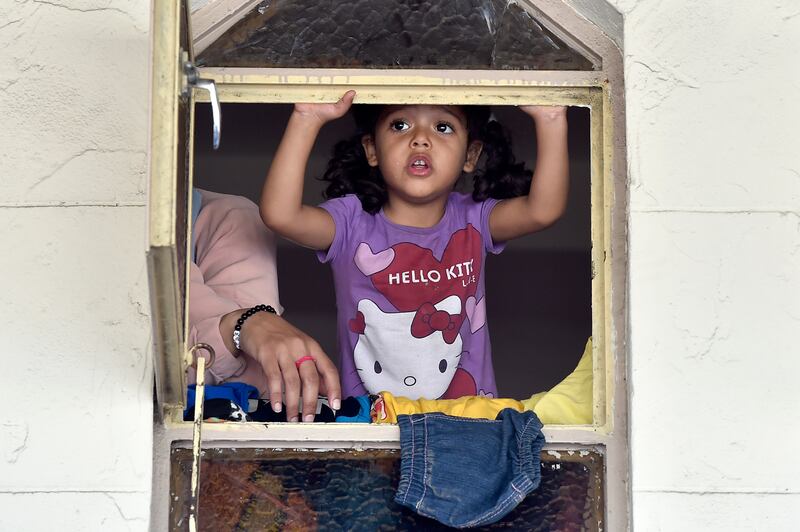The school year for more than 11,000 Palestinian pupils will be postponed indefinitely in Lebanon’s Ain Al Hilweh refugee camp because of armed groups occupying the eight UN schools on the site.
Ain Al Hilweh is the largest refugee camp for Palestinians in Lebanon, with a population of more than 70,000.
Armed groups have occupied compounds containing eight schools belonging to the UN agency for Palestinian refugees since August, when clashes erupted between dominant camp faction Fatah – also the party of Palestinian Authority president Mahmoud Abbas – and rival extremist groups.
The Palestinian Joint Action Authority, comprising Ain Al Hilweh’s various factions, announced it would station the Joint Security Force to help bring about a co-ordinated "withdrawal of gunmen from the Fatah movement and terrorist groups from it at the same time", on Friday.
Dorothy Klaus, Lebanon affairs director of the UN Relief and Works Agency for Palestine Refugees, said enabling more than 11,000 children in Saida to obtain education was the top priority.
"We are seeking every means to achieve this as soon as circumstances allow,” she said.
The academic year for Palestinian refugee children across Lebanon will otherwise begin on October 2, according to Ms Klaus.
UNRWA is "monitoring the situation and working to secure suitable educational spaces for all students in this area, with the aim of starting the academic year as soon as the situation allows,” she added.
About 6,000 pupils affected by the delay of the academic year are from inside the camp.
Outside the camp, the school year will be delayed due to the presence of 500 Ain Al Hilweh residents who have sought shelter in nearby schools after being displaced by the fighting, UNRWA representative Hoda Samra said.
Two deadly waves of battles have resulted in more than 28 people killed and thousands of people displaced throughout Saida, the coastal southern Lebanese city where Ain Al Hilweh is located.
Many displaced residents have been unable to return to the camp, despite a ceasefire announced earlier this month.
The fighting erupted after a round of assassinations from both sides that resulted in the killing of Fatah commander Abu Ashraf Al Armoushi and four of his bodyguards. It was widely perceived as an affront to Fatah’s authority.
Fatah has since sought to oust Islamist insurgents from the camp.
Militants – among them the Al Qaeda-affiliated Jund Al Sham – have barricaded themselves inside the eight schools and have refused to surrender.
The occupied schools have suffered significant damage and destruction, according to Ms Klaus, “while the schools in Saida are sheltering displaced families”.
She stressed that “the schools in the vicinity of the camp must be safe so that children can attend”.
The head of the joint security force, Maj Gen Mahmoud Ajouri, said Fatah along with rival Islamist militants had agreed to evacuate the schools simultaneously.
”The political leadership agreement came about after Hamas and Osbet Al Ansar spoke with [the militants],” Major Gen Ajouri said, referring to Ain Al Hilweh’s main political Islamist factions.
“Both sides agreed to leave on the condition that we tell them at least 24 hours in advance, which we have done.”
It remains to be seen whether the schools will be vacated without any further clashes.
"The next steps are to stabilise the ceasefire and strengthen the Palestinian joint force with elements from all forces and factions," a Fatah media statement said.
Following militants' withdrawal from the schools, the joint security force would enforce security in neighbourhoods affected by the fighting in preparation for displaced families to return to their homes.
Fatah has repeatedly promised forceful retribution against extremist parties if they do not surrender the suspected killers of Mr Al Armoushi, giving the groups a deadline of the end of September to vacate UNRWA schools and surrender his killers.
Experts say the battles have given an advantage to Hamas, Fatah's most prominent rival, which has played up its role as a moderate Islamist party to mediate with the hardline militants behind Mr Al Armoushi's killing.
Meetings between Fatah and Hamas to discuss the clashes have given Fatah rivals – including more radical groups – a larger role in administering security in Ain Al Hilweh through the resurrection of the joint security force, which encompasses all of the camp's factions.
Fatah rivals have long complained of the faction's dominance over Ain Al Hilweh.







